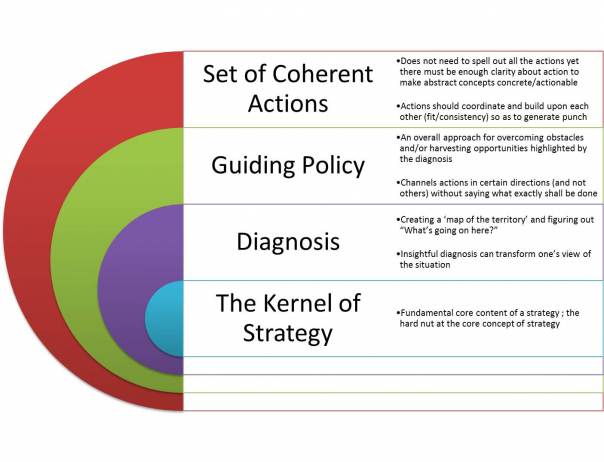Why not stop at Guiding Policy?
“Without action, the world would still be an idea.“ General Georges F. Doriot
Richard Rumelt (Good Strategy Bad Strategy) rightly points out that many equate strategy with guiding policy. And thus the work of strategy and the strategist stops there. He says that this is a mistake. Why? Because strategy is about action not ideas/concepts/theories. Only action has an impact on the situation at hand: influences, shapes, alters that which is. Here is what Rumelt says:
“Strategy is about action, about doing something. The kernel of strategy must contain action. It does not need to point to all the actions that will be taken as events unfold, but there must be enough clarity about action to bring the concepts down to earth. “
Whilst Rumelt does not mention this, I can see another advantage of moving beyond guiding policy and grappling with action. Grappling with action allows me to grapple with feasibility and thus answer the question “Is this a bridge too far?” And thus I find that I am that much more likely to come up with a strategy that occurs as ‘doable’ as opposed to one that shows up us ‘pie in the sky’ for the people who have to enact the strategy. A strategy that is not enacted is worthless. A strategy that is badly enacted is not just worthless it is costly in terms of time, effort, money and depletes faith in management and strategy.
Coherent Action: action that delivers punch
Will any kind of action do? No, serious thought is required. Why? Because the whole can be so much more powerful, pack more punch, than the sum of the parts. Here is what Rumelt says:
“The actions within the kernel of strategy should be coherent. That is the resource deployments, policies and maneuvers that are undertaken should be consistent and coordinated. The coordination of action provides the basic source of leverage or advantage available in strategy……… The idea that coordination, by itself, can be a source of advantage is a very deep principle.“
Just in case this is not clear Rumelt spells it out more bluntly:
“To have punch, actions should coordinate and build upon one another, focusing organisational energy..”
When Rumelt speaks coordination what is he referring to? He is not talking about the commonly accepted way of thinking about coördination: “continuing mutual adjustments among agents”. So what is he talking about, pointing at?
“Strategic coordination, or coherence, is not ad hoc mutual adjustment. It is coherence imposed on a system by policy and design. More specifically, design is the engineering fit among parts, specifying how actions and resources will be combined.”
Why is coherence so powerful
Whilst this sounds easy, I can say from experience that this is one of the hardest feats to accomplish. Whilst the talk suggest that we dealing with one/unity (one team, one organisation, one society..) the reality is that we are permeated by decentralisation/fragmentation/silos. What does Rumelt have to say on this?
“Strategy is visible as coordinated action imposed on a system. When I say strategy is “imposed”, I mean just that. It is an exercise in centralised power, used to overcome the natural workings of a system. This coordination is unnatural in the sense that it would not occur without the hand of strategy.”
Hold on, is Rumelt questioning the free market and decentralisation? Here is what he says on the matter:
“…decentralised decision making cannot do everything. In particular, it may fail when either the costs or benefits of actions are not borne by the decentralised actors. The split between costs and benefits may occur across organisational units or between the present and the future. And decentralised coordination is difficult when benefits accrue only if decisions are properly coordinated.”
If you are working on customer based strategy or customer experience you should be at the edge of your seat. Isn’t one of the key challenges that focussing on the customer does mean taking a hit now (giving up bad profits) in order to win in the longer term through generating ‘good profits’. Isn’t another challenge that the customer orientation requires diverting funds and status from the marketing & sales functions towards the folks that come up with products and the Customer Services function? And how is that going to happen if we leave the product guys to pursue their agenda, the marketing girls to make the numbers that matter to marketing, the sales guys to do whatever it takes to make the numbers and collect commission and we are busy swapping human beings for technology to cut customer service costs? I do hope that you get what I am getting at.
And finally I leave you with some more wise words
“.. strategy is primarily about deciding what is truly important and focusing resources and action on that objective. It is a hard discipline because focusing on one thing slights another….. In many situations, the main impediment to action is the forlorn hope that certain painful choices or actions can be avoided – that the long list of hoped-for “priorities” can all be achieved. It is the handcraft of strategy to decide which priority shall take precedence. Only then can action be taken. And, interestingly, there is no greater tool for sharpening strategic ideas than the necessity to act.”
As your read these words I draw your attention to the failure of the customer-centric orientation to take root and flower. And the failure of governments to do what needs to be done when it comes to banking, financial services, deficits and the structure of western economies…..
